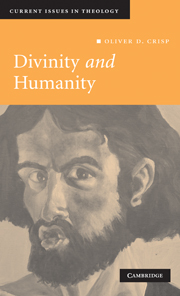3 - The anhypostasia–enhypostasia distinction
Published online by Cambridge University Press: 05 June 2012
Summary
For He took on Himself the elements of our compound nature, and these not as having an independent existence or as being originally an individual, and in this way assumed by Him, but as existing in His own subsistence.
St John of DamascusIn the theological literature the human nature of Christ is sometimes described as an anhypostatos physis, that is, a (human) nature that exists independently of an individual or hypostasis. This, it is said, is consistent with the idea that Christ's human nature does not exist as a person (hypostasis) independent of its assumption by the Word. Instead, the human nature of Christ is said to be ‘impersonal’ prior to the Incarnation and, from the first moment of Incarnation onwards, enhypostatos, that is, a (human) nature that exists ‘in’ a particular person or hypostasis. One way of understanding this would be to say that the human nature assumed by the second person of the Trinity, though never a person as such (independent of the Word), exists ‘in’ the hypostasis or person of the Word and is thereby ‘personalized’ (that is, hypostatized) by the Word. Sometimes this is articulated in terms of the human nature of Christ existing ‘within’, or being ‘taken up into’, the Word. Karl Barth is often cited as a champion of what we might call this an–enhypostasia distinction in recent theology.
- Type
- Chapter
- Information
- Divinity and HumanityThe Incarnation Reconsidered, pp. 72 - 89Publisher: Cambridge University PressPrint publication year: 2007

